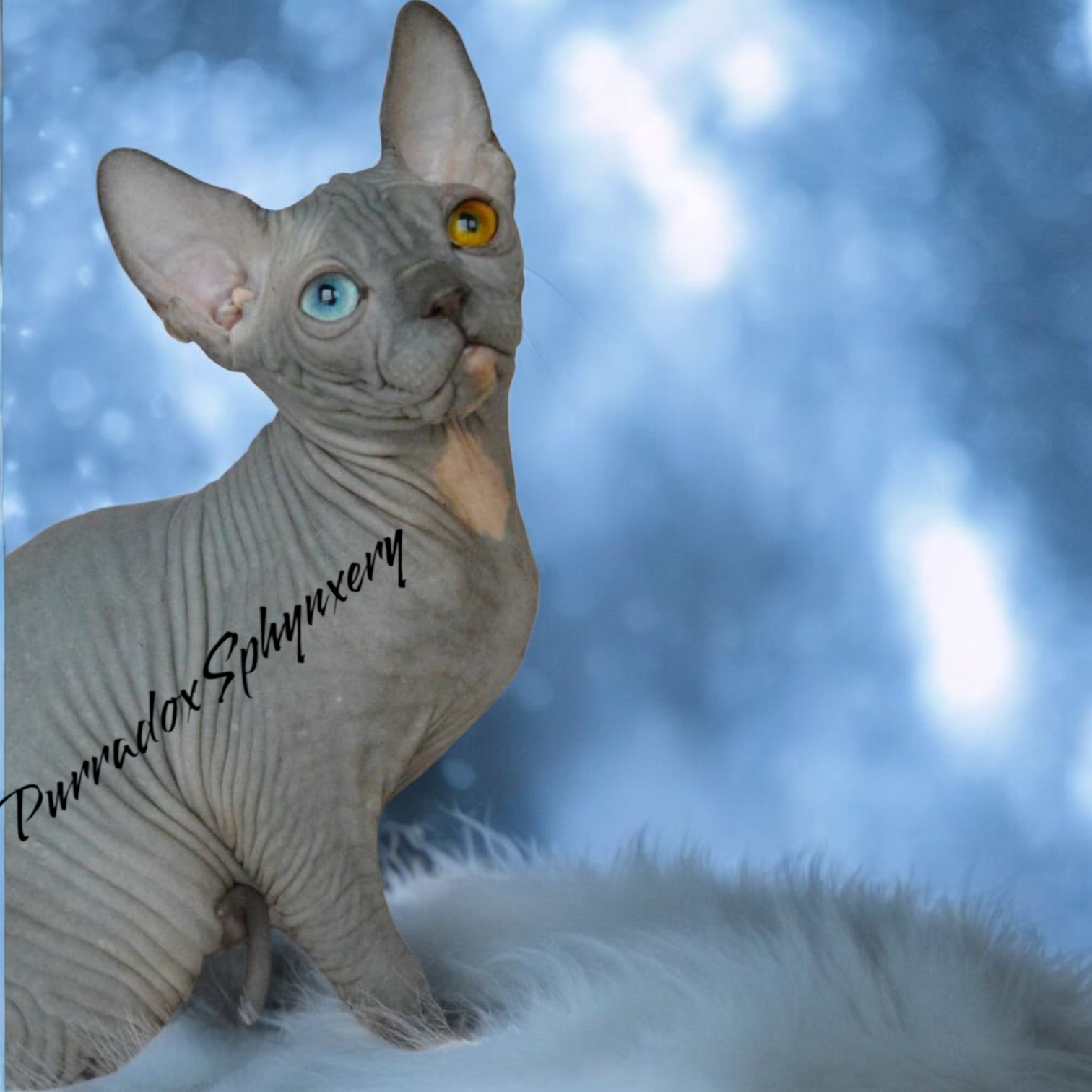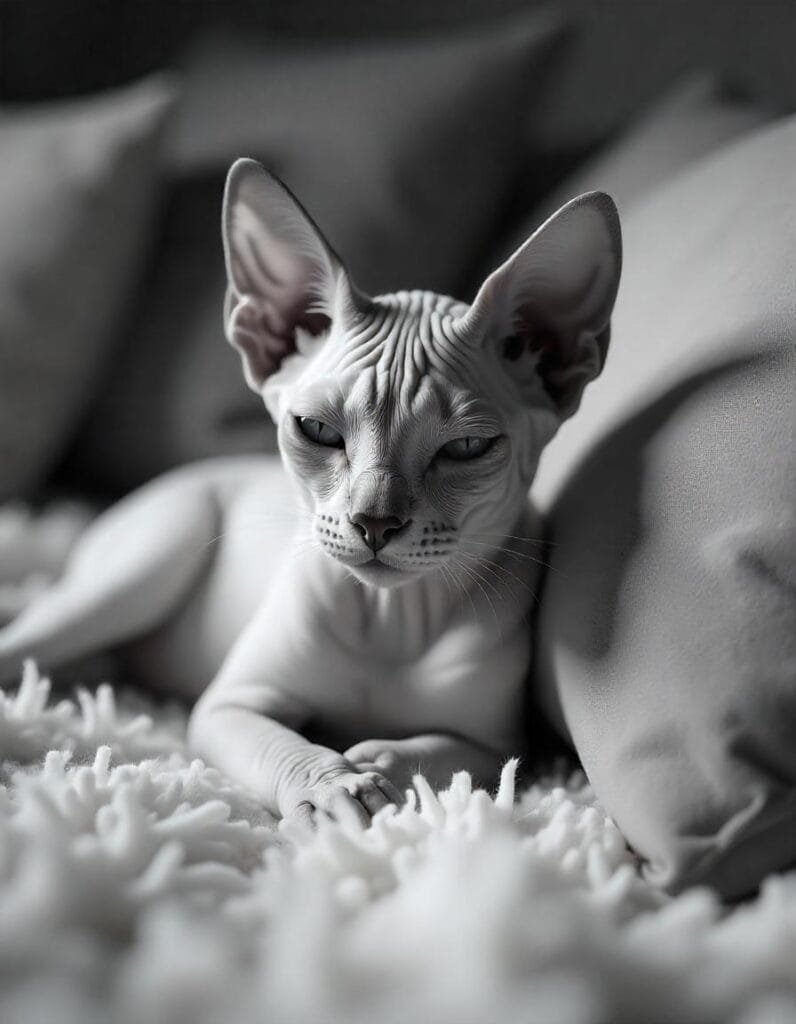Sphynx cats are instantly recognizable for their hairless bodies and large, expressive eyes. But what makes these cats so unique isn’t just their appearance—it’s their genetic makeup. From the gene responsible for their lack of fur to the importance of health screenings, understanding Sphynx cat genetics can help you appreciate these cats even more. In this post, we’ll explore the basics of Sphynx genetics, common genetic health issues, and why responsible breeding is essential for this special breed.
The Hairless Gene: What Makes Sphynx Cats Hairless?
The hallmark feature of the Sphynx cat is, of course, its hairlessness. This unique trait is due to a genetic mutation in the KRT71 gene, which affects the formation of hair follicles. This mutation, called the hr (hairless) gene, causes hair to be sparse or absent altogether, resulting in the Sphynx cat’s signature look.
How the Hairless Gene Works:
- Recessive Trait: The hairless trait in Sphynx cats is a recessive gene. This means that both parent cats must carry the hr gene for their offspring to inherit hairlessness.
- Partial Fur: Although most Sphynx cats appear completely hairless, some may have a fine, downy layer of fuzz on their bodies, especially on areas like the nose, tail, and paws.
- Warmth Needs: Due to the lack of a protective coat, Sphynx cats have higher body temperatures and may seek warmth more often, making cozy beds and blankets essential.
To learn more about caring for hairless cats, visit our guide on Sphynx Cat Care.
Other Unique Genetic Traits in Sphynx Cats
Aside from hairlessness, Sphynx cats have a few other genetic traits that set them apart from other breeds. Their large, bat-like ears, prominent cheekbones, and muscular bodies are partly due to the genetic mutations that influence their overall appearance.
Key Physical Traits:
- Large Ears: The Sphynx’s large ears are partly a result of their hairless genetics, as they lack fur that would typically make ears appear smaller. They’re also an adaptation that helps regulate their body temperature.
- Strong, Muscular Bodies: Sphynx cats have strong, muscular builds that are partially genetic. They’re active cats that benefit from having a well-defined body structure to support their energy and agility.
Common Genetic Health Conditions in Sphynx Cats
Due to their specific genetic makeup, Sphynx cats are prone to certain health conditions. Responsible breeding and health testing can help mitigate some of these risks, but it’s essential to be aware of them when considering a Sphynx cat as a pet.
Common Genetic Health Conditions:
- Hypertrophic Cardiomyopathy (HCM): HCM is a common genetic heart condition in many cat breeds, including Sphynx cats. It causes the walls of the heart to thicken, which can lead to heart failure if left untreated.
- Prevention: Regular heart screenings with a certified cardiologist can help detect HCM early. Ethical breeders screen their breeding cats for HCM to reduce the likelihood of passing it to offspring.
- Hereditary Myopathy: This condition affects muscle function and can cause generalized weakness in affected cats. It is relatively rare but can impact Sphynx cats.
- Prevention: Genetic testing helps identify carriers and prevent the condition from being passed on to kittens.
- Skin Sensitivity and Infections: Due to their hairlessness, Sphynx cats are more prone to skin issues, including fungal infections and allergies.
- Prevention: Regular cleaning and gentle skincare practices can help prevent infections and keep their skin healthy.
For more about caring for your Sphynx cat’s skin and health, check out our post on Grooming and Bathing Sphynx Cats.
The Role of Responsible Breeding in Sphynx Cat Genetics
Due to the genetic risks associated with Sphynx cats, responsible breeding practices are crucial. Ethical breeders prioritize health, temperament, and genetic screening to produce kittens that are as healthy as possible.
Key Practices in Responsible Breeding:
- Genetic Testing: Breeders perform genetic tests on breeding cats to screen for conditions like HCM and hereditary myopathy. This helps prevent the spread of genetic illnesses.
- Health Certificates and Screenings: Reputable breeders provide health certificates and often perform regular health screenings for their breeding cats, particularly for heart and muscle-related conditions.
- Selective Breeding: By carefully selecting breeding pairs based on health, temperament, and conformation, ethical breeders ensure the long-term health and well-being of the Sphynx breed.
If you’re considering a Sphynx cat, be sure to work with a breeder who adheres to responsible practices. Visit our Adoption Process page for guidance on choosing a reputable breeder.
Genetic Testing: How It Protects the Sphynx Breed
Genetic testing has become a cornerstone in responsible breeding, allowing breeders to identify potential carriers of genetic disorders and prevent affected cats from entering breeding programs. This helps maintain the health of the Sphynx breed and reduce the incidence of inherited conditions.
Types of Genetic Tests Commonly Used:
- HCM Screening: This involves regular echocardiograms by a certified cardiologist to detect early signs of HCM.
- Myopathy Tests: DNA tests can identify carriers of the gene responsible for hereditary myopathy, helping breeders make informed decisions.
- Skin Health and Immune Function Tests: Skin sensitivity and immune-related tests help monitor and maintain the health of hairless cats, reducing risks associated with infections.
For more information about our health screening practices, visit our FAQ page.
FAQs About Sphynx Cat Genetics
Q: Is the hairlessness in Sphynx cats natural?
- Yes, Sphynx cats’ hairlessness is due to a natural genetic mutation in the KRT71 gene. This mutation was selectively bred to develop the Sphynx breed as we know it today.
Q: How can I find a Sphynx breeder who does genetic testing?
- Always ask breeders for health certifications and genetic testing results. Reputable breeders are transparent about their health practices and test regularly for conditions like HCM.
For more answers about Sphynx cat health and genetics, visit our FAQ page.
Conclusion
Understanding Sphynx cat genetics provides a deeper appreciation for this unique breed. From the gene that causes their iconic hairlessness to the health conditions that require careful screening, genetics play a major role in what makes Sphynx cats so special. If you’re considering adding a Sphynx to your family, working with a responsible breeder and staying informed about their genetic background can help you provide the best possible care.
For more insights into Sphynx cat care, explore our Sphynx Cat Health section or visit our Adoption Process page to find out more about bringing a Sphynx cat into your home.


